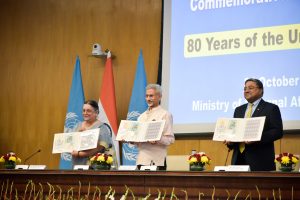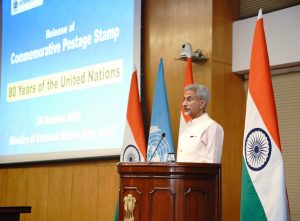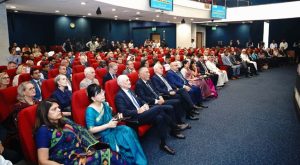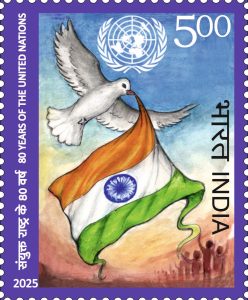Shailesh Kumar, National Defence
New Delhi, 24 October 2025
 India’s External Affairs Minister Dr. S. Jaishankar while releasing a commemorative postal stamp on 80th anniversary of United Nations on UN Day on 24th October in New Delhi said that the ethos of multilateralism are at stakes. He said in an apparent reference to China, a P5 member and Pakistan, currently a non-permanent member of the UN Security Council. The event was attended by many ambassadors of key nations.
India’s External Affairs Minister Dr. S. Jaishankar while releasing a commemorative postal stamp on 80th anniversary of United Nations on UN Day on 24th October in New Delhi said that the ethos of multilateralism are at stakes. He said in an apparent reference to China, a P5 member and Pakistan, currently a non-permanent member of the UN Security Council. The event was attended by many ambassadors of key nations.
EAM Dr S. Jaishankar releases Commemorative Postage Stamp on 80 Years of The United Nations in New Delhi#80yearsofunitednations, #unitednations, #meaindia, @MEAIndia pic.twitter.com/1lS30zgWBM
— NationalDefence (@NDIndiaFirst) October 24, 2025
 Despite diluted multi-lateralism, EAM Jaishankar however expressed India’s commitment to the multilateralism and United Nations. “On UN Day, I would like to reiterate India’s commitment to the ideals of peace and security, as well as development and progress. India has always been and will continue to be a strong votary of the United Nations, and indeed, of multilateralism”.
Despite diluted multi-lateralism, EAM Jaishankar however expressed India’s commitment to the multilateralism and United Nations. “On UN Day, I would like to reiterate India’s commitment to the ideals of peace and security, as well as development and progress. India has always been and will continue to be a strong votary of the United Nations, and indeed, of multilateralism”.
Delighted to launch a commemorative postage stamp today in New Delhi to mark the 80th anniversary of @UN.
Congratulate @IndiaPostOffice for successfully organising the open competition to design the commemorative stamp. The stamp rightly showcases the need for peace in this era… https://t.co/D4CtR1QSgS pic.twitter.com/vOcoanCZat
— Dr. S. Jaishankar (@DrSJaishankar) October 24, 2025
 Dr. Jaishankar, however, pointed out that all is not well with the UN and its decision-making, which neither reflects its membership nor addresses global priorities. He stated that its debates have become increasingly polarised. He stated that any meaningful reform is obstructed using the reform process itself, and financial constraints have emerged as an additional concern. He highlighted that UN’s response to terrorism is a telling example of the challenges being faced by the UN.
Dr. Jaishankar, however, pointed out that all is not well with the UN and its decision-making, which neither reflects its membership nor addresses global priorities. He stated that its debates have become increasingly polarised. He stated that any meaningful reform is obstructed using the reform process itself, and financial constraints have emerged as an additional concern. He highlighted that UN’s response to terrorism is a telling example of the challenges being faced by the UN.
 He said that when a sitting Security Council member openly protects the very organisation that claims responsibility for the barbaric terror attack at Pahalgam, it raises doubts on the credibility of multilateralism. He called it cynical that victims and perpetrators of terrorism are equated in the name of global strategy. He added that the slowing down of the SDG agenda 2030 is a significant metric to measure the distress of the Global South.
He said that when a sitting Security Council member openly protects the very organisation that claims responsibility for the barbaric terror attack at Pahalgam, it raises doubts on the credibility of multilateralism. He called it cynical that victims and perpetrators of terrorism are equated in the name of global strategy. He added that the slowing down of the SDG agenda 2030 is a significant metric to measure the distress of the Global South.
Here is the full speech made by India’s foreign minister Dr. S. Jaishankar
Secretary(Posts) Vandita Kaul ji,
Secretary(West) Sibi George ji,
Excellencies, Ladies and Gentlemen,
Thank you all for joining us this morning and it is really a great pleasure to see so many of you here. I take it as a statement of our collective attachment to the United Nations on this important anniversary at a time when the world is perhaps passing through somewhat difficult circumstances. It is truly a great pleasure to be with you here on this special occasion as we celebrate the 80th anniversary of the United Nations. As a founding member state of the UN, I extend warm wishes to all present on United Nations Day.
Let me begin by congratulating the Department of Posts, Ministry of Communications, for organizing this very successful open competition on MyGov portal, to design the commemorative postage stamp celebrating UN@80. As we heard from Secretary(West), there were more than 740,000 entries which were received from students of classes 9 to 12 across the country and from Arts Colleges across India.
It must have been a very difficult job to select the winning entry but I also want to say that the stamp that was selected, unveiled a little while ago, depicts the need for peace in this era of conflict. Even today, we are regrettably witnessing multiple major conflicts that not only take a great toll on human lives, but impact the well-being of the entire international community. The Global South, in particular, has felt this pain even as the more developed insulated themselves from consequences.
An 80th Anniversary is a significant milestone for any institution. On UN Day, I would like to reiterate India’s commitment to the ideals of peace and security, as well as development and progress. India has always been and will continue to be a strong votary of the United Nations, and indeed, of multilateralism.
Our commitment to global peace and security is reflected, amongst others, in our staunch support for peacekeeping, and I am glad that the first day cover captures that particular facet as well. We visualize this as a fundamental obligation of a conscientious member. The energies and resources that we have devoted and the sacrifices that our personnel have made certainly ensure that the world is a better place. Significantly, just last week, we hosted a Chiefs of Army Staff Conclave in New Delhi, which witnessed participation from thirty Troop Contributing Countries.
That said, we must also recognize that all is not well with the United Nations. Its decision-making neither reflects its membership nor addresses global priorities. Its debates have become increasingly polarized and its working visibly gridlocked. Any meaningful reform is obstructed using the reform process itself. Now, financial constraints have emerged as an additional concern. How to sustain the UN even while seeking its re-invention is clearly a major challenge before all of us.
Few examples are more telling about the challenges facing the UN than its response to terrorism. When a sitting Security Council member openly protects the very organization that claims responsibility for the barbaric terror attack such as at Pahalgam, what does it do to the credibility of multilateralism? Similarly, if victims and perpetrators of terrorism are equated in the name of global strategy, how much more cynical can the world get. When self-proclaimed terrorists are shielded from the sanctioning process, what does it say for the sincerity of those involved?
If the maintenance of international peace and security has become lip service, the predicament of development and socio-economic progress is even more serious. The slowing down of the SDG Agenda 2030 is a significant metric to measure the distress of the Global South. There are many more, whether it is trade measures, supply chain dependence or political domination.
Yet, on such a notable anniversary, we cannot abandon hope. However difficult, the commitment to multilateralism must remain strong. However flawed, the United Nations must be supported in this time of crisis. Our faith in international cooperation must be reiterated and indeed renewed. It is in that spirit that we all meet to mark this occasion and seek to build a better world.
I thank you again for joining us on this important day, on this important anniversary and as my colleague said, what unites us is what is most important and the fact that we are meeting here today, I think sends a message in itself.
Thank you for your attention.
New Delhi
October 24, 2025

Comments